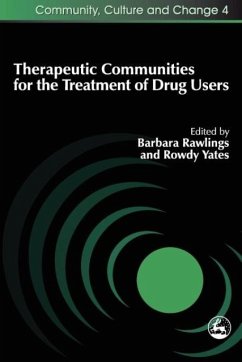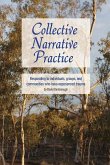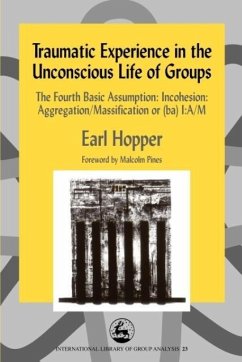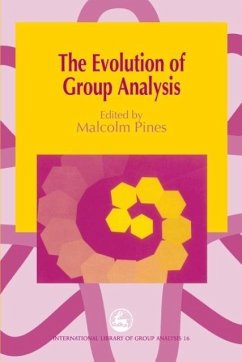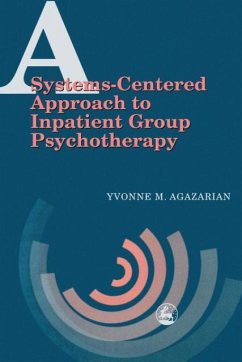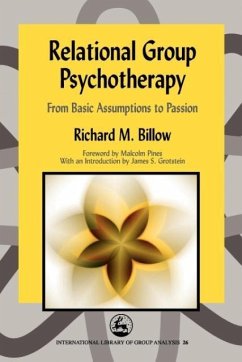Rody Yates
Therapeutic Communities for the Treatment of Drug Users
Herausgeber: Rawlings, Barbara; Yates, Rowdy
Rody Yates
Therapeutic Communities for the Treatment of Drug Users
Herausgeber: Rawlings, Barbara; Yates, Rowdy
- Broschiertes Buch
- Merkliste
- Auf die Merkliste
- Bewerten Bewerten
- Teilen
- Produkt teilen
- Produkterinnerung
- Produkterinnerung
The majority of therapeutic communities treating drug users are 'concept-based': they are hierarchical with the staff forming a chain of command. In this authoritative new study, the authors explore the most significant differences between this approach and democratic therapeutic communities, including their hierarchical structures, their confrontational group sessions and their total prohibition of drugs.
Andere Kunden interessierten sich auch für
![Collective Narrative Practice Collective Narrative Practice]() David DenboroughCollective Narrative Practice23,99 €
David DenboroughCollective Narrative Practice23,99 €![Traumatic Experience in the Unconscious Life of Groups Traumatic Experience in the Unconscious Life of Groups]() Earl HopperTraumatic Experience in the Unconscious Life of Groups58,99 €
Earl HopperTraumatic Experience in the Unconscious Life of Groups58,99 €![The Evolution of Group Analysis The Evolution of Group Analysis]() The Evolution of Group Analysis65,99 €
The Evolution of Group Analysis65,99 €![A System-Centered Approaches to Inpatient Group Psychotherapy A System-Centered Approaches to Inpatient Group Psychotherapy]() Yvonne M. AgazarianA System-Centered Approaches to Inpatient Group Psychotherapy56,99 €
Yvonne M. AgazarianA System-Centered Approaches to Inpatient Group Psychotherapy56,99 €![Group Action Group Action]() T. Martin RingerGroup Action51,99 €
T. Martin RingerGroup Action51,99 €![Relational Group Psychotherapy Relational Group Psychotherapy]() Richard M. BillowRelational Group Psychotherapy48,99 €
Richard M. BillowRelational Group Psychotherapy48,99 €![Self Experiences in Group Intersubjective and Self Psychological Pathways to Human Understanding Self Experiences in Group Intersubjective and Self Psychological Pathways to Human Understanding]() Self Experiences in Group Intersubjective and Self Psychological Pathways to Human Understanding56,99 €
Self Experiences in Group Intersubjective and Self Psychological Pathways to Human Understanding56,99 €-
-
-
The majority of therapeutic communities treating drug users are 'concept-based': they are hierarchical with the staff forming a chain of command. In this authoritative new study, the authors explore the most significant differences between this approach and democratic therapeutic communities, including their hierarchical structures, their confrontational group sessions and their total prohibition of drugs.
Hinweis: Dieser Artikel kann nur an eine deutsche Lieferadresse ausgeliefert werden.
Hinweis: Dieser Artikel kann nur an eine deutsche Lieferadresse ausgeliefert werden.
Produktdetails
- Produktdetails
- Verlag: Jessica Kingsley Publishers, Ltd
- Seitenzahl: 276
- Erscheinungstermin: 1. Januar 2001
- Englisch
- Abmessung: 234mm x 156mm x 15mm
- Gewicht: 424g
- ISBN-13: 9781853028175
- ISBN-10: 1853028177
- Artikelnr.: 21390610
- Herstellerkennzeichnung
- Produktsicherheitsverantwortliche/r
- Europaallee 1
- 36244 Bad Hersfeld
- gpsr@libri.de
- Verlag: Jessica Kingsley Publishers, Ltd
- Seitenzahl: 276
- Erscheinungstermin: 1. Januar 2001
- Englisch
- Abmessung: 234mm x 156mm x 15mm
- Gewicht: 424g
- ISBN-13: 9781853028175
- ISBN-10: 1853028177
- Artikelnr.: 21390610
- Herstellerkennzeichnung
- Produktsicherheitsverantwortliche/r
- Europaallee 1
- 36244 Bad Hersfeld
- gpsr@libri.de
Barbara Rawlings has worked in a hierarchical therapeutic community for drug users and a democratic therapeutic community for adolescents with behavioural difficulties, as well as conducting reviews on TCs for the Prison Service of England and Wales and the High Security Psychiatric Services Commissioning Board. She is an Honorary Fellow in the Department of Sociology at the University of Manchester, and is currently conducting qualitative research in therapeutic communities. Rowdy Yates is director of the Scottish Drugs Training Project at the University of Stirling. He was previously the Director of a non-residential treatment service for drug users for more than two decades. He is the Executive President of the European Working Group on Drugs Oriented Research (EWODOR) and an associate member of the European Federation of Therapeutic Communities.
Introduction
Barbara Rawlings and Rowdy Yates. Part One: Background. 1. Therapeutic Communities for drug users: description and overview
Eric Broekhaert
University of Ghent
Belgium. 2. Democratic and concept-based Therapeutic Communities and the development of community therapy
Salvatore Raimo
CEIS Verona
Italy. Part Two: Situation Worldwide. 3. The history of Therapeutic Communities: a view from Europe
Martien Kooyman
Emiliehoeve Therapeutic Community and Erasmus University
the Netherlands. 4. Therapeutic Communities for substance abuse: developments in North America
George De Leon
Center for Therapeutic Community Research
National Development and Research Institutes
Inc
New York. 5. Therapeutic Communities for the treatment of addictions in Australia
Clive F. Lloyd and Frances V. O'Callaghan
Griffith University
Gold Coast
Australia. Part Three: Life in the Therapeutic Community. 6. The staff member in the Therapeutic Community
Alan Woodhams
New Directions Therapeutic Community
HMP Channings Wood
England. 7. Self-help or sink-or-swim? The experience of residents in a UK concept-based Therapeutic Community
Keith Burnett
CAN
Northampton
England. 8. The ex-resident experience of working as a staff member in a Therapeutic Community
Staff from the Ley Community
Oxford
England. Part Four: Modifications to the Therapeutic Community Model. 9. Therapeutic Communities for drug-misusing offenders in prison
Peter Mason
Diana Mason and Nadia Brooks
PDM Consulting
London. 10. The modern Therapeutic Community: dual diagnosis and the process of change
Rowdy Yates and Jane Wilson
University of Stirling
Scotland. 11. The significance of resettlement support on completion of a drug rehabilitation Therapeutic Community program
Paul Goodman and Karen Nolan
the Ley Community
Oxford
EnglandPart Five: Research and Evaluation. 12. Evaluative research in Therapeutic Communities
Barbara Rawlings. 13. An outcome study of a Therapeutic Community based in the community: a five-year prospective study of drug users in Norway
Edle Ravndal
National Institute for Alcohol and Drug Research
Norway. 14. Therapeutic Communities in prisons and work release: effective modalities for drug-involved offenders
James A. Inciardi
Steven S. Martin and Hilary L. Surratt
Center for Drug and Alcohol Studies
University of Delaware
USA.References. Index.
Barbara Rawlings and Rowdy Yates. Part One: Background. 1. Therapeutic Communities for drug users: description and overview
Eric Broekhaert
University of Ghent
Belgium. 2. Democratic and concept-based Therapeutic Communities and the development of community therapy
Salvatore Raimo
CEIS Verona
Italy. Part Two: Situation Worldwide. 3. The history of Therapeutic Communities: a view from Europe
Martien Kooyman
Emiliehoeve Therapeutic Community and Erasmus University
the Netherlands. 4. Therapeutic Communities for substance abuse: developments in North America
George De Leon
Center for Therapeutic Community Research
National Development and Research Institutes
Inc
New York. 5. Therapeutic Communities for the treatment of addictions in Australia
Clive F. Lloyd and Frances V. O'Callaghan
Griffith University
Gold Coast
Australia. Part Three: Life in the Therapeutic Community. 6. The staff member in the Therapeutic Community
Alan Woodhams
New Directions Therapeutic Community
HMP Channings Wood
England. 7. Self-help or sink-or-swim? The experience of residents in a UK concept-based Therapeutic Community
Keith Burnett
CAN
Northampton
England. 8. The ex-resident experience of working as a staff member in a Therapeutic Community
Staff from the Ley Community
Oxford
England. Part Four: Modifications to the Therapeutic Community Model. 9. Therapeutic Communities for drug-misusing offenders in prison
Peter Mason
Diana Mason and Nadia Brooks
PDM Consulting
London. 10. The modern Therapeutic Community: dual diagnosis and the process of change
Rowdy Yates and Jane Wilson
University of Stirling
Scotland. 11. The significance of resettlement support on completion of a drug rehabilitation Therapeutic Community program
Paul Goodman and Karen Nolan
the Ley Community
Oxford
EnglandPart Five: Research and Evaluation. 12. Evaluative research in Therapeutic Communities
Barbara Rawlings. 13. An outcome study of a Therapeutic Community based in the community: a five-year prospective study of drug users in Norway
Edle Ravndal
National Institute for Alcohol and Drug Research
Norway. 14. Therapeutic Communities in prisons and work release: effective modalities for drug-involved offenders
James A. Inciardi
Steven S. Martin and Hilary L. Surratt
Center for Drug and Alcohol Studies
University of Delaware
USA.References. Index.
Introduction
Barbara Rawlings and Rowdy Yates. Part One: Background. 1. Therapeutic Communities for drug users: description and overview
Eric Broekhaert
University of Ghent
Belgium. 2. Democratic and concept-based Therapeutic Communities and the development of community therapy
Salvatore Raimo
CEIS Verona
Italy. Part Two: Situation Worldwide. 3. The history of Therapeutic Communities: a view from Europe
Martien Kooyman
Emiliehoeve Therapeutic Community and Erasmus University
the Netherlands. 4. Therapeutic Communities for substance abuse: developments in North America
George De Leon
Center for Therapeutic Community Research
National Development and Research Institutes
Inc
New York. 5. Therapeutic Communities for the treatment of addictions in Australia
Clive F. Lloyd and Frances V. O'Callaghan
Griffith University
Gold Coast
Australia. Part Three: Life in the Therapeutic Community. 6. The staff member in the Therapeutic Community
Alan Woodhams
New Directions Therapeutic Community
HMP Channings Wood
England. 7. Self-help or sink-or-swim? The experience of residents in a UK concept-based Therapeutic Community
Keith Burnett
CAN
Northampton
England. 8. The ex-resident experience of working as a staff member in a Therapeutic Community
Staff from the Ley Community
Oxford
England. Part Four: Modifications to the Therapeutic Community Model. 9. Therapeutic Communities for drug-misusing offenders in prison
Peter Mason
Diana Mason and Nadia Brooks
PDM Consulting
London. 10. The modern Therapeutic Community: dual diagnosis and the process of change
Rowdy Yates and Jane Wilson
University of Stirling
Scotland. 11. The significance of resettlement support on completion of a drug rehabilitation Therapeutic Community program
Paul Goodman and Karen Nolan
the Ley Community
Oxford
EnglandPart Five: Research and Evaluation. 12. Evaluative research in Therapeutic Communities
Barbara Rawlings. 13. An outcome study of a Therapeutic Community based in the community: a five-year prospective study of drug users in Norway
Edle Ravndal
National Institute for Alcohol and Drug Research
Norway. 14. Therapeutic Communities in prisons and work release: effective modalities for drug-involved offenders
James A. Inciardi
Steven S. Martin and Hilary L. Surratt
Center for Drug and Alcohol Studies
University of Delaware
USA.References. Index.
Barbara Rawlings and Rowdy Yates. Part One: Background. 1. Therapeutic Communities for drug users: description and overview
Eric Broekhaert
University of Ghent
Belgium. 2. Democratic and concept-based Therapeutic Communities and the development of community therapy
Salvatore Raimo
CEIS Verona
Italy. Part Two: Situation Worldwide. 3. The history of Therapeutic Communities: a view from Europe
Martien Kooyman
Emiliehoeve Therapeutic Community and Erasmus University
the Netherlands. 4. Therapeutic Communities for substance abuse: developments in North America
George De Leon
Center for Therapeutic Community Research
National Development and Research Institutes
Inc
New York. 5. Therapeutic Communities for the treatment of addictions in Australia
Clive F. Lloyd and Frances V. O'Callaghan
Griffith University
Gold Coast
Australia. Part Three: Life in the Therapeutic Community. 6. The staff member in the Therapeutic Community
Alan Woodhams
New Directions Therapeutic Community
HMP Channings Wood
England. 7. Self-help or sink-or-swim? The experience of residents in a UK concept-based Therapeutic Community
Keith Burnett
CAN
Northampton
England. 8. The ex-resident experience of working as a staff member in a Therapeutic Community
Staff from the Ley Community
Oxford
England. Part Four: Modifications to the Therapeutic Community Model. 9. Therapeutic Communities for drug-misusing offenders in prison
Peter Mason
Diana Mason and Nadia Brooks
PDM Consulting
London. 10. The modern Therapeutic Community: dual diagnosis and the process of change
Rowdy Yates and Jane Wilson
University of Stirling
Scotland. 11. The significance of resettlement support on completion of a drug rehabilitation Therapeutic Community program
Paul Goodman and Karen Nolan
the Ley Community
Oxford
EnglandPart Five: Research and Evaluation. 12. Evaluative research in Therapeutic Communities
Barbara Rawlings. 13. An outcome study of a Therapeutic Community based in the community: a five-year prospective study of drug users in Norway
Edle Ravndal
National Institute for Alcohol and Drug Research
Norway. 14. Therapeutic Communities in prisons and work release: effective modalities for drug-involved offenders
James A. Inciardi
Steven S. Martin and Hilary L. Surratt
Center for Drug and Alcohol Studies
University of Delaware
USA.References. Index.

